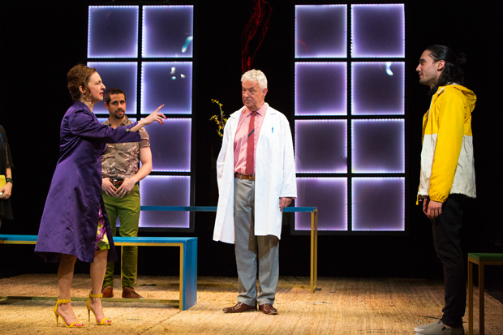Exquisita Agonía (Exquisite Agony)
By Nilo Cruz; Directed by José Zayas
Off Broadway, Play
Runs through 8.3.18
Repertorio Español, 138 East 27th Street
by Piper Rasmussen on 6.2.18

Luz Nicolás, Pedro De León, Germán Jaramillo, and Gilberto Gabriel Díaz Flores in Exquisita Agonía. Photo by Emmanuel Abreu.
BOTTOM LINE: In Exquisita Agonía, a young man with a recent heart transplant is coaxed into the world—and perhaps the role—of his donor.
In Exquisita Agonía (Exquisite Agony), Nilo Cruz (Pulitzer Prize for Anna in The Tropics) tells a story of love and loss rooted firmly in the Romantic world of the artistic upper class. Opera singer Millie Marcel (Luz Nicolás) loses her famous classical-musician husband Lorenzo in a fatal car accident. His heart is quickly transplanted into a "grateful donor." Millie convinces the heart surgeon, Doctor Castillo (Germán Jaramillo), to connect her with the young, poor recipient, a pet-store worker named Amér (Gilberto Gabriel Díaz Flores) who has traveled from his home country for this surgery. Millie approaches the compassionate but reluctant Amér with a complicated romantic fervor that throws her family into disarray, hoping her husband's heart remembers her. Millie’s adult daughter Romy (Soraya Padrao) and son Tommy (Gonzalo Trigueros), Amér’s brother Imanol (Pedro De León), and even Amér himself, would prefer to let Lorenzo rest in peace, but Millie pursues Amér and his new heart relentlessly, wallowing in her grief and romantic obsession.
I was reminded of a poem, “The Heart Is a Foreign Country” by Rangi McNeil: “Ours is a partial language part pantomime, / part grimy guesswork.” Nilo Cruz shows that the language of Millie’s heart, and of all his other characters, are similarly grafted. There is Millie's pantomimed fantasy that Lorenzo’s memories might be real and accessible through Amér; Amér entertains the possibility that his new heart has given him dreams with images from Lorenzo’s life. The science of whether or how a physical heart can contain memories is discussed several times, and indulged by the cardiac surgeon as, falling in love with Millie, his heart jumps for joy, but it doesn't always feel like the characters wholeheartedly (so to speak) believe what they're saying. Then there's the other language spoken: the grimy, disappointing possibility that Millie is just lonely, has lost her creative outlet as a performer, and is caught up in this fantasy to avoid the lackluster reality of her former marriage. In a very Nilo Cruz-Chekhovian style, people in Exquisita Agonía speak often about their dreams and motivations, but are perhaps not being honest with themselves.
That Millie, with her sensitive, cultured persona, treats others so callously during this grieving proces—Millie and Romy’s response to an outburst from Tommy toward the end of the play is truly shocking—speaks to the most fascinating theme of this piece: “elitismo.” Millie’s overwrought emotional states go part and parcel with her class: Millie’s romantic, musical passions and those of the late Lorenzo reportedly overwhelmed their interest in their children; Romy and Millie connect as they arrange a bouquet of orchids; and Doctor Castillo subverts his medical expertise to accommodate the fanciful sensuality of a woman almost always dressed in jewel-toned satin (Fernando Then’s costumes are the perfect kind of gaudy). Even though Millie is making everyone uncomfortable, she draws them into socializing with all the trappings of an elite lifestyle—beautiful home, beautiful daughter, delicious food, wide drink selection—as payment for their time and attention. The “gift of life” Amér now has, to live as he will with a new heart, seems very cheap to Millie as she drags out their involvement and doesn’t make an effort to get to know him at all.
In the midst of these interesting investigations of emotional overindulgence and generosity, Díaz Flores is a graceful, sensitive Amér; with all the indignities he’s made to suffer, he needs to be. Nicolás’s Millie is sensual, even earthy, making her flights of fancy a little jarring. Some blocking choices are difficult to decipher, but if concessions must be made to Raúl Abrego's gorgeous lightbox-and-aortic-red-tree set, it is worth it.
Who has the right to be heard and understood, and indulge in emotion, and for how long? Should anyone try to limit how they respond to the irresistible call of their own heart? In any language, of the heart or otherwise, these are interesting questions for audiences.
(Exquisita Agonía plays at Repertorio Español, 138 East 27th Street, through August 3, 2018. Running time is 2 hours with one intermission. Performances are certain Fridays and Saturdays at 8, and Sundays at 3; see website for exact schedule. Tickets are $17-72 and are available at repertorio.nyc or by calling 212-225-9999.)
Exquisita Agonía is by Nilo Cruz. Directed by José Zayas. Set Design by Raúl Abrego. Lighting Design by Manuel Da Silva. Sound Design by Rafael López. Costume Design by Fernando Then. Assistant Director is María Ortiz Poveda. Subtitles by Edna Lee Figueroa.
The cast is Luz Nicolás, Germán Jaramillo, Gilberto Gabriel Díaz Flores, Pedro De León, Soraya Padrao, and Gonzalo Trigueros.

